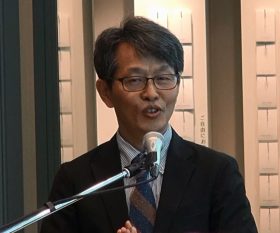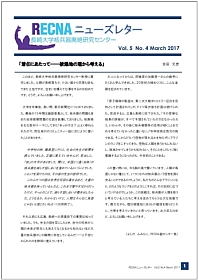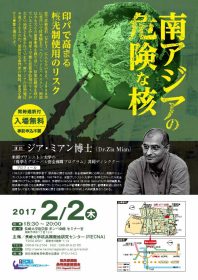November 20, 2016
Preamble
Since the establishment of Research Center for Nuclear Weapons Abolition, Nagasaki University (RECNA), it has intensively conducted a research on denuclearization of Northeast Asia and establishment of a Northeast Asia Nuclear Weapons Free Zone (NEA-NWFZ) and it published a policy proposal on the comprehensive approach toward the establishment of NEA-NWFZ in 2015.
In 2016, in order to promote the realization the above mentioned policy proposal, RECNA and PCU (Prefecture, City and University) Nagasaki Council for Nuclear Weapons Abolition(PCU-NC) initiate various activities named “Nagasaki Process” to facilitate political process to realize peace and security in Northeast Asia through establishment of a NEA-NWFZ involving experts from the region and relevant countries and international organizations. Panel on Peace and Security of Northeast Asia (PSNA) will function as a main body of Nagasaki Process.
Section 1 Objectives
- 1.1 The overall objective of the Nagasaki Process is to support and promote the creation of peace and security of Northeast Asia through establishment of a NEA-NWFZ.
- 1.2 In order to achieve the overall objective, the Nagasaki Process is intended:
- 1.2.1 To formulate practical policy proposals
- 1.2.2 To promote dialogues among participants and possible dialogue with DPRK
- 1.2.3 To promote better understandings among peoples of the region
Section 2 Expected Impact
- 2.1 By promoting dialogues and formulating practical policy proposals, the expected impacts of the Nagasaki Process are as follows:
- 2.1.1 By providing possible policy alternatives, convincing relevant policy makers as well as peoples of the relevant countries;
- 2.1.2 By promoting dialogues, enhancing mutual understanding and solving misunderstanding, and contributing to regional confidence building;
- 2.1.3 By continuing dialogue, showing our determination to engage each other.
Section 3 Governing Principles
- 3.1 The Nagasaki Process, in its activities and practices, will be;
- Inclusive and comprehensive
- Respectful of cultural norms and differences
- Focused on peacebuilding opportunities, rather than military solutions
- Constructive, not critical
- Paying due respect to human dignity as well as national sovereignty
- Collaborative
- Open and respectful in its communications
Section 4 Panel on Peace and Security of Northeast Asia
- 4.0 Mission of the Panel is described in the attached Mission Statement.
- 4.1 The Panel shall be independent and non-partisan.
- 4.2 Members of the Panel shall be invited as individuals, not in their official capacities.
- 4.3 New panel members shall be invited by the names of Co-Chairs based on recommendations of more than two members. In selection of new members, due considerations shall be paid to adequate geographical, ethnic, cultural and gender distribution.
- 4.4 Duration of memberships shall be three years from their appointment and the duration of each member may be extended.
- 4.5 The Panel shall nominate Co-Chairs by voting.
- 4.6 The Co-Chairs shall discharge the following functions;
- Representing the Panel
- Preparing provisional agenda for the Panel
- Coordinating the meetings and workshops with assistance by RECNA
- Other relevant matters
- 4.7 Co-Chairs serve for a term of three years, and can be re-elected. In order not to have all seats elected the same year, terms will be staggered – one or two seats will be elected on separate years.
- 4.8. In spite of the above provisions, the initial members of the Panel and the first Co-Chairs shall be nominated by RECNA through consultation with PCU-Nagasaki Council. Initial Co-Chairs serve for a term with special arrangements, i.e. one chair will serve for one year, another one for two years, the remaining two will serve for three years.
Section 5 Relationship to Relevant Processes
- 5.1 The Nagasaki Process will seek a constructive relationship with any relevant national, regional and multilateral governmental processes.
- 5.2 The Nagasaki Process will seek a cooperative relationship with any relevant activity of civil society, including that of local governments.
- 5.3 Contributions to Track 1 and Track 1.5 will be pursued, particularly through the transmission of relevant outcomes of the Nagasaki Process meetings to relevant actors.
Section 6 Secretariat and Administration
- 6.1 Initially, RECNA will act as a secretariat of the Nagasaki Process until the Panel decides otherwise and RECNA will take primary responsibility for the followings with cooperation of other participants and relevant organizations;
- Calling for meetings
- Providing logistical support for meetings
- Providing secretarial support for meetings
- Communications among members
- Public Relations
- Raising funds
- Other administrative matters
Section 7 Participants and Target Groups
- 7.1 All participants of the Nagasaki process shall be treated as individuals regardless of their affiliations or official status and all meetings shall be conducted under the “Chatham House Rule” unless the participants of the certain meeting would decide otherwise.
- 7.2 While all participants shall be treated as individuals, all participants are expected to make efforts to promote the objectives of the Nagasaki Process by transmitting, disseminating or publicizing the outputs of the meetings among their groups, nationals, colleagues, and so on.





















